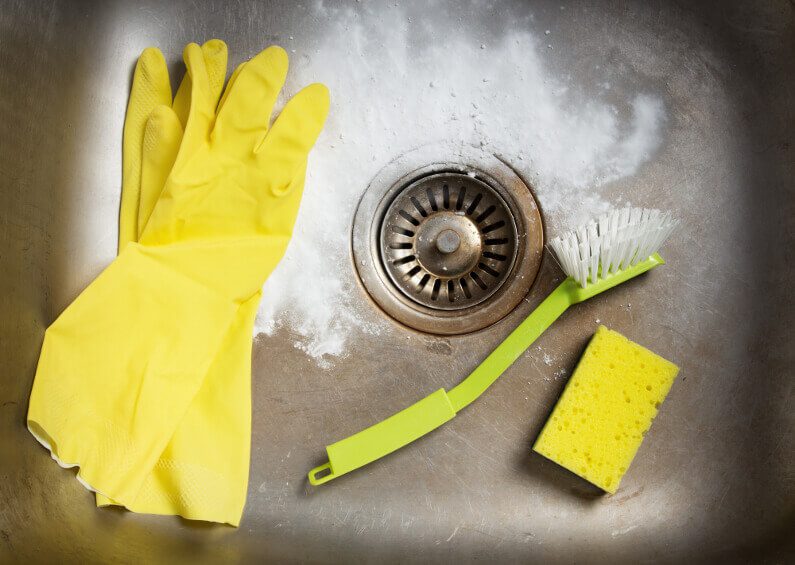In the quest for a clog-free and hygienic home, selecting a high-quality drain cleaner is essential. The market offers a variety of cleaners, each designed to tackle different types of clogs and suited for various plumbing systems. Understanding the differences between chemical, enzymatic and mechanical cleaners is crucial in making an informed choice. Chemical cleaners offer quick results but require careful handling, while enzymatic options provide an eco-friendly alternative. Mechanical tools physically remove clogs without chemicals.
Different Types of Drain Cleaners
Before I talk about specific drain cleaners that are good to use, it’s important to know about the different kinds you can choose from. Each kind of drain cleaner is made differently, and they are good at fixing different types of clogs.
Chemical Drain Cleaners
Chemical drain cleaners are the most common and widely used. They usually contain ingredients like sodium hydroxide or sulfuric acid, which work by dissolving the clog. However, they must be used with caution due to their potentially corrosive nature.
Enzymatic Drain Cleaners
A more environmentally friendly option, enzymatic cleaners use natural enzymes to break down organic materials in clogs. They are safer for your pipes and the environment but may take longer to work.
Mechanical Drain Cleaners
These include tools like plungers and plumber’s snakes. They physically remove clogs without chemicals and are ideal for large obstructions.
Top Picks for Chemical Drain Cleaners
When it comes to chemical cleaners, effectiveness and safety are key. Here are our top recommendations:
- Drain-O Max Gel: Known for it’s fast-acting formula, it’s effective on even the toughest clogs.
- Liquid-Plumr Pro-Strength: This product not only clears clogs but also prevents future blockages.
- Green Gobbler Ultimate Main Drain Opener: Eco-friendly and safe for all types of pipes.
Best Enzymatic Drain Cleaners
For those seeking a greener solution, here are our enzymatic cleaner top picks:
- Bio-Clean Drain Septic Bacteria: A blend of natural bacteria and enzymes, this cleaner is effective and eco-friendly.
- Earth Enzymes Drain Opener: A non-toxic choice that’s safe for septic systems.
- Flo-Kem Flo-Zyme Commercial Bio-Enzyme Drain Opener: Great for heavy-duty use and safe for all pipes.
Top Mechanical Drain Cleaning Tools
Sometimes, a physical tool is what’s needed to tackle tough clogs. Here are our recommendations:
- Ridgid 59787 K-3 Toilet Auger: Ideal for toilet clogs, it’s durable and easy to use.
- Tacklife Drain Auger: Perfect for various types of clogs and comes with a 25-foot cable.
- FlexiSnake Drain Millipede: Excellent for hair clogs, it’s flexible and easy to maneuver.
Safety Tips When Using Drain Cleaners
Safety should always be a priority when dealing with drain cleaners. Here are some tips:
| Safety Tip | Description |
|---|---|
| Wear Protective Gear | Always use gloves and eye protection when handling chemical cleaners to prevent skin burns and eye irritation. |
| Follow Instructions | Read and adhere to the product label’s instructions meticulously for safe and effective use. |
| Do Not Mix Cleaners | Avoid combining different types of cleaners, as this can lead to hazardous chemical reactions. |
| Ensure Ventilation | Work in a well-ventilated area to avoid inhaling fumes, which can be harmful to your respiratory system. |
| Store Safely | Keep drain cleaners out of reach of children and pets and store them in a cool, dry place to prevent accidental ingestion or chemical reactions. |
| Dispose Properly | Dispose of any unused cleaner or container according to local regulations to avoid environmental contamination. |
| Test on Small Area | Before applying a cleaner, test it on a small, inconspicuous area to check for any adverse reactions with your pipes. |
| Avoid Prolonged Contact | Minimize contact with surfaces, as some cleaners can cause damage if left for longer than recommended. |
| Be Cautious with Old Pipes | Use milder cleaners or mechanical methods if you have older or fragile plumbing to prevent pipe damage. |
| Seek Professional Help | If unsure or the clog persists, consult a professional plumber to avoid worsening the situation. |
Preventive Measures to Avoid Clogs
Prevention is better than cure. Here are some tips to keep your drains clog-free:
- Regularly use a drain strainer to catch hair and food particles.
- Avoid pouring grease or oil down the drain.
- Flush drains regularly with hot water to prevent buildup.
- Consider regular use of an enzymatic cleaner for maintenance.
Expert Tips for Using Drain Cleaners Effectively
Using drain cleaners effectively can save time and prevent damage to your plumbing system. Here are expert tips to maximize their efficacy:
Read and Understand the Product Instructions
Reading and understanding product instructions is crucial when using drain cleaners. These guidelines provide essential information on proper usage, safety precautions and handling. They ensure the cleaner is used effectively and safely, preventing potential harm to both the user and the plumbing system. Always consult these instructions before application.
Use the Correct Amount
Using the correct amount of drain cleaner is vital for effectiveness and safety. Overusing can damage pipes and underusing may not resolve the clog. Adhering to the recommended quantity ensures optimal results without harming your plumbing. This balance maximizes efficiency while minimizing the risk of pipe corrosion or damage.
Allow Sufficient Time for the Cleaner to Work
Allowing sufficient time for the drain cleaner to work is key to effectively dissolving clogs. Each product has a specific timeframe to act, which is crucial for it’s success. Rushing this process can lead to incomplete clog removal, while waiting the appropriate duration ensures thorough and effective drain clearing.
Flush with Hot Water After Use
After using a drain cleaner, it’s important to flush the drain with hot water. This step helps to rinse away any remaining cleaner and dislodged debris, ensuring the drain is thoroughly cleared. Hot water also aids in dissolving residual material, promoting a clean and fully functional drainage system.
Frequently Asked Questions (FAQs)
Chemical drain cleaners can be harsh on certain types of pipes, such as older metal or PVC pipes. It’s important to choose a product that’s safe for your specific plumbing.
Not all drain cleaners are suitable for use in a garbage disposal. Check the product label for compatibility.
Frequent use of chemical drain cleaners can damage pipes over time. It’s better to use them only when necessary and rely on mechanical methods or enzymatic cleaners for regular maintenance.
Not all drain cleaners are suitable for garbage disposals. Check the product’s label for specific usage instructions and compatibility with garbage disposal systems.
Frequent use of chemical drain cleaners can lead to pipe deterioration over time. It’s recommended to use them sparingly and opt for mechanical or enzymatic cleaners for regular maintenance.
Drain cleaners are effective on many types of clogs, particularly those caused by organic material. However, they may not be effective on solid obstructions like toys or sanitary products.
Yes, enzymatic drain cleaners are generally more eco-friendly as they use natural enzymes to break down clogs, making them safer for the environment and your plumbing.
Final Thoughts
Maintaining a clog-free home requires a combination of the right products and practices. Whether you opt for a chemical, enzymatic or mechanical drain cleaner. Remember to use it responsibly and in accordance with it’s intended purpose. Regular preventive measures can also go a long way in keeping your drains flowing smoothly.
Remember, a clog-free home contributes to a healthier, more efficient living environment. By choosing the right drain cleaner and following our expert tips, you can ensure that your home remains in top condition.





This post is packed with useful information I could implement immediately. The breakdown of different types of drain cleaners is so helpful. Now I know which one to choose based on my needs. Thanks for making it easy to understand!